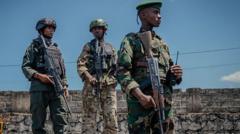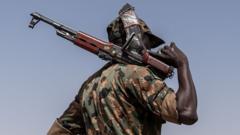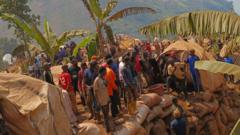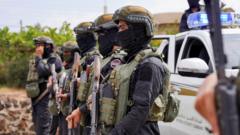In a significant diplomatic shift, Rwanda announced its withdrawal from the Economic Community of Central African States (Eccas) following a disagreement regarding its planned chairmanship. This decision comes amid escalating conflicts in eastern DR Congo, where Rwanda is accused of supporting the M23 rebel group.
Rwanda Withdraws from Regional Bloc Amid DR Congo Tensions

Rwanda Withdraws from Regional Bloc Amid DR Congo Tensions
Rwanda's exit from the Economic Community of Central African States follows a contentious dispute over its involvement in the ongoing conflict with the Democratic Republic of Congo.
Rwanda has officially declared its exit from the Eccas, claiming its rights to assume the chairman role were overlooked intentionally, aligning with the Democratic Republic of Congo's (DRC) agenda. Rwanda stated that continuing its membership in the bloc, which is intended to promote cooperation and integration among member states, was unjustifiable given the current situation.
This diplomatic row escalated during a summit in Equatorial Guinea, where leaders from Eccas sided with the Congolese government, asserting that Rwanda’s military actions constituted aggression. The summit decreed that Equatorial Guinea would retain the chairmanship until a resolution is achieved, further aggravating tensions between the two countries.
Rwanda's role in the conflict has raised significant international concern, with accusations from both the DRC government and global powers like the US and France claiming that Rwanda has been providing support to the M23 rebels, who captured important eastern cities including Goma and Bukavu earlier this year. A report by UN experts last year indicated the presence of Rwandan troops in combat alongside the rebels—allegations Rwanda strongly refutes, arguing their military is stationed at the border strictly for defensive purposes.
This is not the first instance of Rwanda exiting the Eccas; it previously withdrew in 2007 but rejoined the bloc several years later. The ongoing violence and political strife in eastern DR Congo continue to unravel the fabric of regional relations, as Rwanda navigates its withdrawal in the midst of peace efforts being mediated by the United States.
The conflict and its implications for regional stability remain a pressing concern. The dispute not only highlights the fragile relations between Rwanda and DR Congo but also raises questions about the efficacy of regional bodies in promoting peace and collaboration in Central Africa.
This diplomatic row escalated during a summit in Equatorial Guinea, where leaders from Eccas sided with the Congolese government, asserting that Rwanda’s military actions constituted aggression. The summit decreed that Equatorial Guinea would retain the chairmanship until a resolution is achieved, further aggravating tensions between the two countries.
Rwanda's role in the conflict has raised significant international concern, with accusations from both the DRC government and global powers like the US and France claiming that Rwanda has been providing support to the M23 rebels, who captured important eastern cities including Goma and Bukavu earlier this year. A report by UN experts last year indicated the presence of Rwandan troops in combat alongside the rebels—allegations Rwanda strongly refutes, arguing their military is stationed at the border strictly for defensive purposes.
This is not the first instance of Rwanda exiting the Eccas; it previously withdrew in 2007 but rejoined the bloc several years later. The ongoing violence and political strife in eastern DR Congo continue to unravel the fabric of regional relations, as Rwanda navigates its withdrawal in the midst of peace efforts being mediated by the United States.
The conflict and its implications for regional stability remain a pressing concern. The dispute not only highlights the fragile relations between Rwanda and DR Congo but also raises questions about the efficacy of regional bodies in promoting peace and collaboration in Central Africa.






















